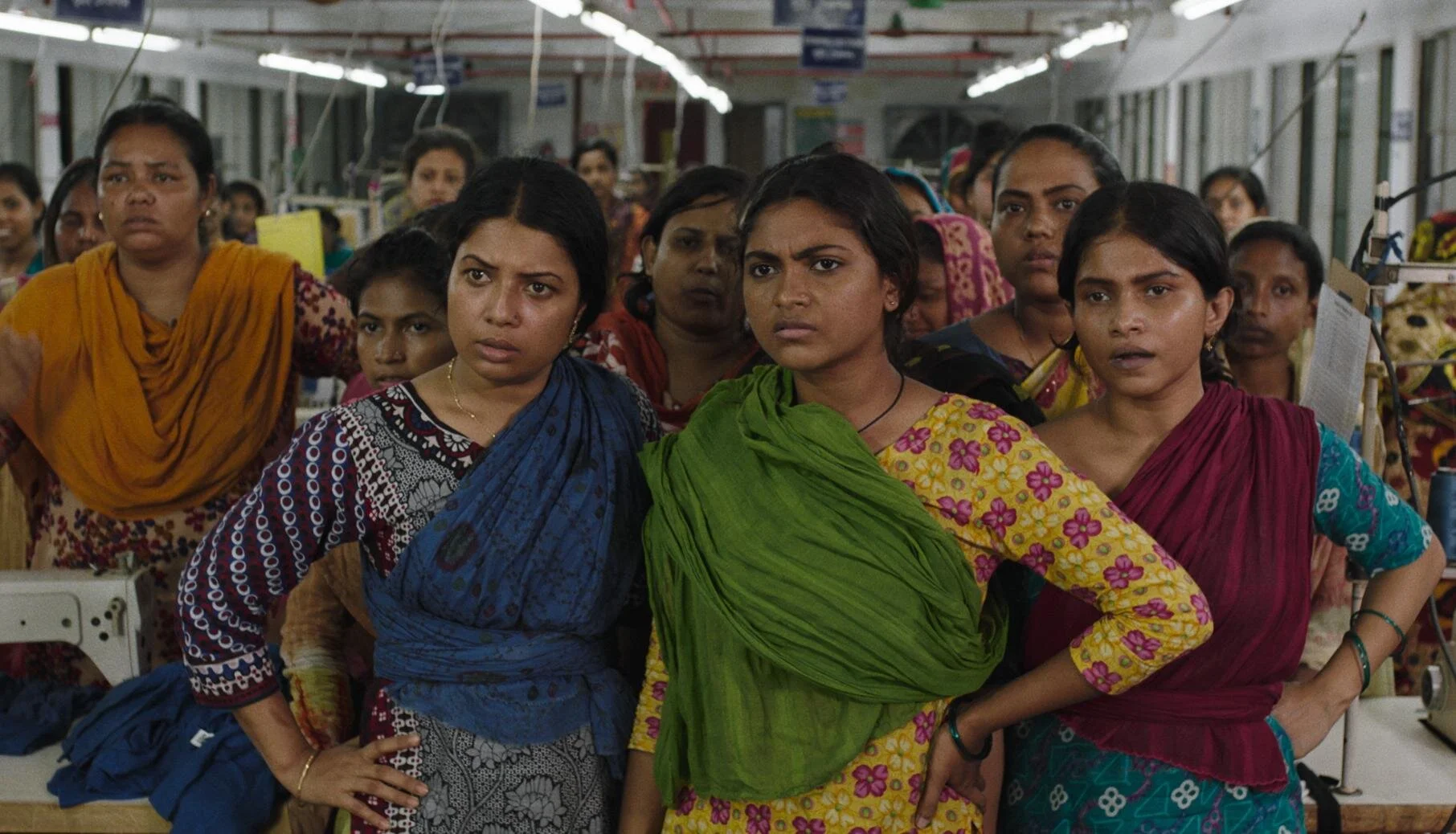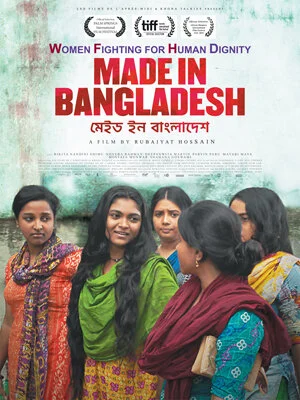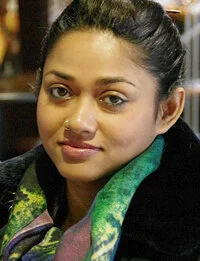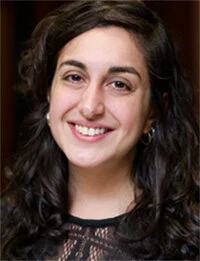Please join us for our special screening followed by Q&A with
Herrana Addisu
Advocacy Officer, Freedom United
Shortlisted for the Stop Slavery Campaigns Award
Shikha Silliman Bhattacharjee
Research Fellow
Zolberg Institute on Migration and Mobility, The New School
Rubaiyat Hossain
Film Director
5:30 p.m. | Registration
6:00 p.m. | Film Screening
7:30 p.m. | Q+A
Screening begins promptly at 6:00 p.m.
Dolby 88 Screening Room
1350 Avenue of the Americas (at West 55th Street)
Lobby Level
New York, NY 10019
ADMISSION
UNA Members: $10
Guests and Non-Members: $15
All Students attend for FREE
When was the last time that you thought about how the branded clothes that you buy get made? About the people who make them and the conditions under which they do so? Probably never, right? Director Rubaiyat Hossain wants to change that with her film, MADE IN BANGLADESH, which premiered recently at many international film festivals.
As fast fashion brands continue to dominate the globe, an army of underpaid workers, the majority of them women, keep producing their merchandise at a discount. But what happens when such women, emancipated by employment opportunities that previously didn’t exist, and motivated by dangerous, sometimes deadly working conditions, decide to fight the powers that be?
In Rubaiyat Hossain’s insightful docudrama, MADE IN BANGLADESH, we follow one such female worker. The outspoken and tenacious 23-year-old Shimu, originally from a small village, works in one of Dhaka’s thousands of sweatshops, her husband unemployed. Faced with difficult conditions at work, she decides to start a union with her co-workers. Despite threats from the management and the disapproval of her husband, Shimu is determined to go on. Together the women must fight and find a way.
The ready-made garment (RMG) industry is the strongest element of Bangladeshi development, second in the world only to China, in producing these garments, and the world’s second-largest exporter of fast fashion brands. Some 3.5 million workers toil in nearly 5,000 garment factories in Bangladesh. In the fiscal year 2018-19, the sector exported in the volume of US $34 billion, which is 80 percent of the country’s total export revenue. Some 85 percent of the grossly underpaid and exploited workers are women.
Miserable and unsafe conditions prevail, as the Bangladesh factories press workers to meet deadlines set by ordering companies. Many are forced to work 12-14 hours a day, seven days a week for far less than a living wage. Fires periodically kill dozens of workers.
The Bangladesh apparel industry began in the 1980s. The Bangladesh Garment Manufacturers and Exporters Association (BGMEA), one of the largest trade associations in the country representing the RMG industry, currently has 4,621 member factories. While 3,856 of these are identified as operational — only 3.8% out of them are unionized. About 3.6 million workers are reported to be employed there, with 53% female and 47% male. But with sewing machine operators, a whopping 80% are women. The average age of workers is 25.
While the strength of this film is Bangladesh itself and features plenty of local scenes with its crowded streets and people, director Rubaiyat Hossain was interested in examining the lived experiences of women amidst their social conditions.
“I did some research for three years, meeting lots of factory workers,” she said. “I eventually came across a woman named Daliya, a union leader. I felt she was courageous, strong and articulate. She had been treated so badly, being in an abusive marriage, but she was longing for dignity. So I could begin to write my story, which is loosely based on real events of her life.”
A common paradox in Bangladesh is that both empowerment and oppression exist for its women. However, Hossain asserts that “our head of state is a woman, the opposition leader is a woman, the speaker of Parliament is a woman. The backbone of Bangladesh’s economy is carried by young women… as long as a woman is resisting and fighting, she will get somewhere. Generations before us had fought for education and voting rights for women, that is why we are here today.”
What especially struck her was the fact that “even with very little pay, difficult conditions at work, struggles against patriarchy at home, these women are empowered. Because one hundred years ago in Bangladesh, women could not even work, they had to live in seclusion. Today they are working, making a living for themselves and their families, and they are fighting within the factory and at home for their rights.”
Much of the film revolves around Shimu, and Rikita Nandini Shimu is a true wonder, alternately fiery and indignant and gentle and hesitant. It’s a well-rounded, charismatic performance, and a final scene that brings together all of those elements, as she fights for her rights and for her union, is an invigorating one.
Join us for a special screening of this emotionally rousing work, MADE IN BANGLADESH, which will be followed by a Q+A afterwards, with the film's director Rubaiyat Hossain, Freedom United advocacy officer Herrana Addisu, and Shikha Silliman Bhattacharjee, research fellow at the Zolberg Institute on Migration and Mobility at the New School.
Panel Speakers
RUBAIYAT HOSSAIN
Rubaiyat Hossain is a filmmaker, writer and interdisciplinary researcher. She has completed her B. A. in Women Studies from Smith College, USA and M. A. in South Asian Studies from University of Pennsylvania, USA. Her primary fields of interest are Sufism, Bengali nationalism, formation of Bengali modernity and its correlation with female sexuality. Rubaiyat Hossain has worked for prominent women’s rights NGOs in Bangladesh. She has worked as a part time lecturer in the department of Economics and Social Sciences at BRAC University, Dhaka, Bangladesh since 2006.
Rubaiyat is one of Bangladesh’s handful of female filmmakers, known for her debut feature film Meherjaan (2011) which faced political and cultural wrath in Bangladesh for its anti-war narrative, and its critic of masculine nationalism from a feminine point of view. Her second feature film Under Construction (2015) premiered at New Directors Showcase at Seattle International Film festival and was theatrically released and well received in Bangladesh. Her third feature film Made in Bangladesh (2019), premiered at Toronto International Film Festival and distributed by Pyramide Films. Rubaiyat uses a feminist lens to deconstruct the otherwise phallocentric institution of cinema.
Currently she lives between Dhaka and New York making films and attending Tisch School of Arts at New York University in Cinema Studies.
HERRANA ADDISU
Herrana Addisu is the New York-based Advocacy Officer for Freedom United. She supports their U.S. and international campaigns to combat forced labor and modern-day slavery. She is currently leading Freedom United’s ILO Forced Labor Protocol campaign, calling on all UN member states to ratify.
Before joining Freedom United, Herrana worked as the Program Assistant for the Institute for Women’s Leadership and a Research and Policy Fellow for the NGO Working on Women, Peace, and Security.
Prior to that, she aided the Permanent Mission of Costa Rica to the United Nations, where she conducted research on peacekeeping, security, and gender, and monitored meetings for the First and Fourth Committees.
As an undergraduate, Herrana has interned with Amnesty International USA and Hyacinth AIDS Foundation. She acquired a Master’s Degree in United Nations and Global Policy with a concentration in International Law, Human Rights, and Gender Equality, and a Bachelor’s Degree in Political Science and Women and Gender Studies from Rutgers University.
She found her passion for labor rights when she studied for a semester abroad in a graduate school at the University of Kassel (Germany) with the International Center for Development and Decent Work. She conducted research on business and human rights.
As an Ethiopian native, Herrana speaks fluent Amharic and English.
SHIKHA SILLIMAN BHATTACHARJEE
Shikha Silliman Bhattacharjee is a Research Fellow at the Zolberg Institute on Migration and Mobility at the New School for Social Research, and Global Labor Justice. Shikha’s research and writing takes an interdisciplinary and transnational perspective in understanding labour markets, migration, and variegated citizenship. Shikha’s focus on female labor migration for employment in garment, domestic, and other work sectors provides a prism for understanding interactions between gendered social governance and legal, financial, and political regimes.
She has completed her JD from the University of Pennsylvania Law School, a BA in English and Ethnicity, Race and Migration from Yale University, and is a PhD Candidate in Jurisprudence and Social Policy at Berkeley Law.
Shikha’s work is informed by more than a decade of experience working with grassroots campaigns and civil society organizations in the U.S., South Asia, and globally, using legal, media and community organizing approaches. Shikha is a Research Fellow at Global Labor Justice. She has been an Ella Baker fellow at the Center for Constitutional Rights, a researcher for Human Rights Watch, and a Fulbright fellow at Swayam. She has worked with numerous organizations in South Asia including Asia Floor Wage Alliance, Human Rights Law Network, Jan Sahas Social Development Society, PRADAN, the Society for Labour and Development, and the South Asia Women’s Fund.
In 2015, Shikha jointly founded HELM Social Design Studio, the first social design studio in South Asia dedicated to partnering with human rights defenders and their organizations to ideate, fund and build social design solutions that promote human rights and access to justice.





